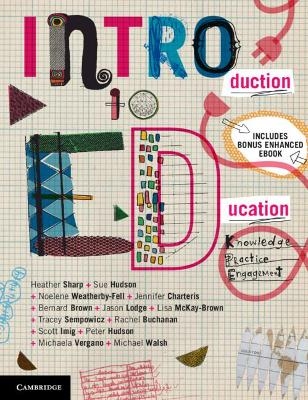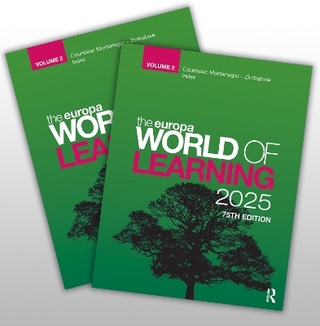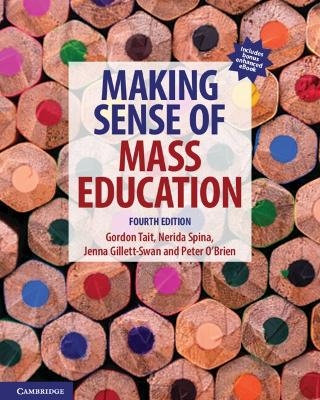
Introduction to Education
Cambridge University Press
978-1-108-90018-8 (ISBN)
Introduction to Education provides pre-service teachers with an overview of the context, craft and practice of teaching in Australian schools as they commence the journey from learner to classroom teacher. Each chapter poses questions about the nature of teaching students, and guides readers though the Australian Professional Standards for Teachers. Incorporating recent research and theoretical literature, Introduction to Education presents a critical consideration of the professional, policy and curriculum contexts of teaching in Australia. The book covers theoretical topics in chapters addressing assessment, planning, safe learning environments, and working with colleagues, families, carers and communities. More practical chapters discuss professional experience and building a career after graduation. Rigorous in conception and practical in scope, Introduction to Education welcomes new educators to the theory and practical elements of teaching, learning, and professional practice.
Heather Sharp is an Associate Professor at the University of Newcastle. Beginning her education career as a History and English high school teacher, Heather has taught in education foundations since commencing her tertiary career in 2006. Heather is a founding member of the HERMES research group. Her current research investigates the teaching of difficult pasts, the influence of public history in teaching, historical representations in school curriculum, WWI remembrance studies, public memory, and Australian history. She has been an invited researcher at the Georg Eckert Institute, Germany and Linnaeus University, Sweden. Heather has taught and coordinated education courses in the areas of education foundations, History curriculum and pedagogies, literacies, education as a professional career, assessment, professional experience, and leads international study tours. Dr Suzanne Hudson (PhD) is the Deputy Dean, Professional Experience across the three campuses of Southern Cross University. Sue has held various leadership roles in the tertiary sector during her career. Through close collaborations with principals, teachers and school staff, Sue co-developed and led a large Australian Federal Government grant titled “Teacher Education Done Differently” (TEDD).The TEDD project team was recognised with an Australian Award for University Teaching (AAUT) citation and an award the following year for Programs that Enhance Student Learning. Sue is the co-developer of the Mentoring for Effective Teaching (MET) program that develops the skills and practices of mentor teachers who support preservice and beginning teachers. MET has been successfully delivered across Australia and internationally for over a decade. Although Sue has a range of research interests, school-university partnerships, professional experience, innovative approaches to teacher education and, induction and mentoring are her focus. Dr Noelene Weatherby-Fell (PhD) is the Head of Students (Education) at the University of Wollongong, NSW, providing leadership in supporting students in their academic progress and wellbeing, and in curriculum and pedagogy. Noelene is committed to preparing classroom and school-ready teachers, and her research interests include preservice teacher preparation, leadership and professional learning in schools, and pastoral care of students and teachers. Noelene has presented and written about her work nationally and internationally with the Response Ability Project (HIMH), was a project team member on the Office for Learning and Teaching project BRiTE (Building Resilience in Teacher Education), and continues to work with colleagues across the higher education sector with the Staying BRiTE Project. Noelene represents the School and the University on State and National bodies that govern the standards for teacher education courses and their accreditation, and wrote and edited the teacher education text, Learning to Teach in the Secondary School (2015), with colleagues. Dr Jennifer Charteris is Head of Department Learners, Learning and Teaching in the School of Education at the University of New England. As a teacher educator with teaching experience in Aotearoa/New Zealand, Australia and the UK, Jennifer has worked with principals, teachers, students, and school communities across the primary, secondary and tertiary sectors. Jennifer has provided professional learning for principals and teachers in strengthening school leadership, developing processes around the effective assessment and culturally responsive pedagogies. Her research interests span pedagogy in innovative learning environments, practitioner inquiry, student voice, assessment for learning, and teacher professional learning. Bernard has had a long involvement in education working in schools and universities both in Australia and abroad. He holds a Bachelor of Arts Degree (Honours), a Graduate Diploma in Education, a TESOL Certificate, a Masters Degree in Education and a PhD in Education. Bernard has published articles in journals and a book chapter and is currently working on several research projects. Bernard has been an academic staff member at the University of Canberra since 2017. He teaches a range of units at the undergraduate and postgraduate levels focused on curriculum, education policy, leadership, and in the Masters Program in Hangzhou China. He currently holds the position of Deputy Program Director of Secondary Education, and is a member of a number of educational committees. Jason Lodge, PhD is Associate Professor of Educational Psychology in the School of Education and Institute for Teaching and Learning Innovation at the University of Queensland. He is also Honorary Principal Research Fellow in the Melbourne Graduate School of Education, The University of Melbourne. Jason's research focusses on the cognitive, metacognitive, social and emotional mechanisms of concept learning and conceptual change. He also conducts research on the translation of the science of learning into practice in educational settings, particularly in digital learning environments and higher education. Dr Lisa McKay-Brown is a senior lecturer in Learning Intervention at the Melbourne Graduate School of Education at the University of Melbourne. She is an academic and classroom teacher with extensive experience in both the health and education sectors. Lisa has worked in primary, secondary and special education settings, and specialist alcohol and other drug services. She been involved with a range of research projects in the fields of health and education including projects focusing on helpseeking for alcohol and mental health in adolescence and In2School, a multidisciplinary program that uses evidence-based educational and therapeutic interventions for school refusal. Internationally Lisa is researching the implementation of inclusive education in Ecuador and Peru. She is particularly interested in how young people with mental health disorders and other disabilities are marginalised by education settings and how this can be challenged. Tracey Sempowicz lives in Queensland, Australia and lectures at the University of the Sunshine Coast, in the fields of child and adolescent development and learning, and inclusive education. She works with pre-service teachers who are completing their primary or secondary education programs. Previously, she was a secondary school teacher and Head of Department in five metropolitan and rural schools over a 25-year period. Her research interests include child and adolescent development, with a particular focus on understanding the neuroscience which underpins development, and the impact of attachment disruption and trauma on children's development and learning. She strives to raise awareness about trauma-informed and inclusive practices in schools. Dr Rachel Buchanan is the Deputy Head of School (Postgraduate Teaching and Learning) and a Senior Lecturer in the School of Education at the University of Newcastle, Australia. She lectures in educational foundations and educational leadership, and has published in the areas of educational philosophy, pedagogy, and education policy and politics. Her researches centers on social justice and equity in education, leading to her work in projects on academic literacy, widening participation, educational policy and equity issues associated with the increased use of digital technologies. Her research project uses postdigital theory to explore the emerging frontiers of educational technologies. Scott Imig is an Associate Professor in the School of Education at the University of Newcastle (AU), where also serves as Deputy Head for Research and Convenor for the Graduate Leadership and Management Program. Scott's research is primarily focused on the preparation and support of school leaders and teachers. He is currently researching and writing about ways that educators can support the wellbeing of children and families with refugee and asylum-seeker backgrounds. Scott works extensively with schools in New South Wales where he conducts professional development in the areas of coaching, leadership, effective teaching and school transformation. In all of his work, Scott is primarily concerned with improving the quality of education for all children and creating environments in which educators and students thrive. Adjunct Associate Professor Peter Hudson (PhD) has a teaching career spanning 38 years, which includes 10 years as a primary school principal and lecturing in universities (Southern Cross University, Queensland University of Technology). He has over 180 publications in journals and conferences, supervised many national and international doctoral students, and has held substantial Australian Commonwealth grants to advance educational practices. Peter was instrumental in devising and implementing international education courses for QUT (e.g., a Bachelor of Education degree in Malaysia). His Mentoring for Effective Teaching (MET, see www.METprogram.com) model is at the forefront of his work in education, with over 3000 trained MET facilitators linked to various schools, universities and institutes. Peter also lead the development and implementation of the Mentoring Beginning Teachers (MBT) program in Queensland. Michaela is a lecturer in the Faculty of Education at the University of Canberra. She is an Education Doctoral student, researching Pedagogical Content Knowledge and teacher practice in personalised planning. This builds on her previous studies in educational leadership and inclusive education, where she developed an interest in leading teaching and learning in inclusive schools. Prior to entering academia Michaela worked for over 25 years in Catholic, Independent and Tertiary institutions, predominantly in the secondary sphere in both New South Wales and the Australian Capital Territory. She has facilitated and delivered a variety of seminars, lectures and presentations on students with disability and diverse needs across many educational jurisdictions. Michaela previously held the position of Inclusive Education Coordinator at a Secondary College as well as having worked as a Learning Support Curriculum Officer for Catholic Education – Archdiocese of Canberra and Goulburn.
Part I. Introduction to Education: 1. What is a teacher?; 2. How do I prepare to be a teacher?; 3. Why is the education system organised this way?; 4. Who are my students?; Part II. Understanding Learning and Understanding Teaching: 5. How do students learn?; 6. Why are students taught this?; 7. How do I plan effective teaching and learning?; 8. How do I implement effective teaching and learning?; 9. How do I assess, provide feedback and report on learning?; 10. What is in a teacher's toolkit?; Part III. Working in Education Contexts: 11. How do I create and maintain supportive learning environments?; 12. How do I work with colleagues, parents, carers and the community?; Part IV. Developing Professional Practice: 13. How do I make the most of professional experience?; 14. When do I stop learning?
| Erscheint lt. Verlag | 1.10.2021 |
|---|---|
| Zusatzinfo | Worked examples or Exercises |
| Verlagsort | Cambridge |
| Sprache | englisch |
| Maße | 215 x 280 mm |
| Gewicht | 1110 g |
| Themenwelt | Sozialwissenschaften ► Pädagogik ► Allgemeines / Lexika |
| Sozialwissenschaften ► Pädagogik ► Bildungstheorie | |
| ISBN-10 | 1-108-90018-6 / 1108900186 |
| ISBN-13 | 978-1-108-90018-8 / 9781108900188 |
| Zustand | Neuware |
| Haben Sie eine Frage zum Produkt? |
aus dem Bereich


